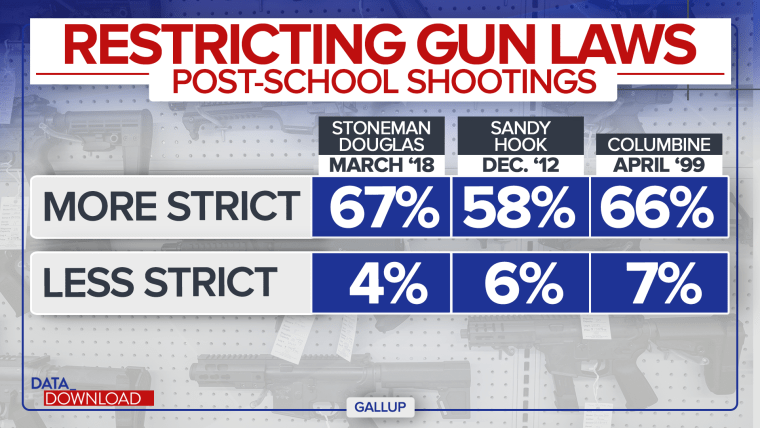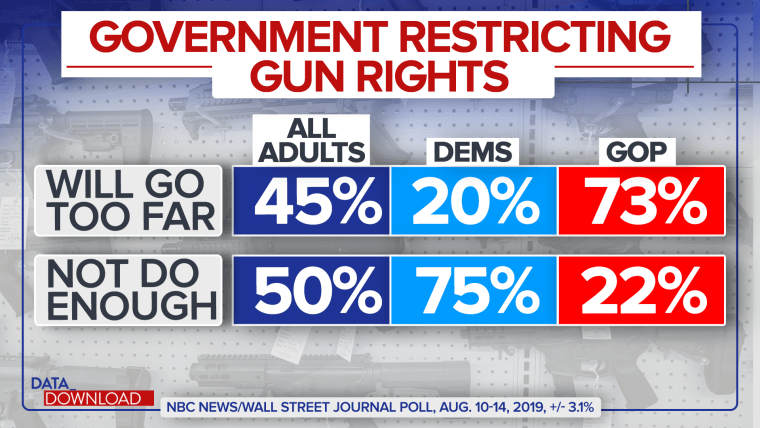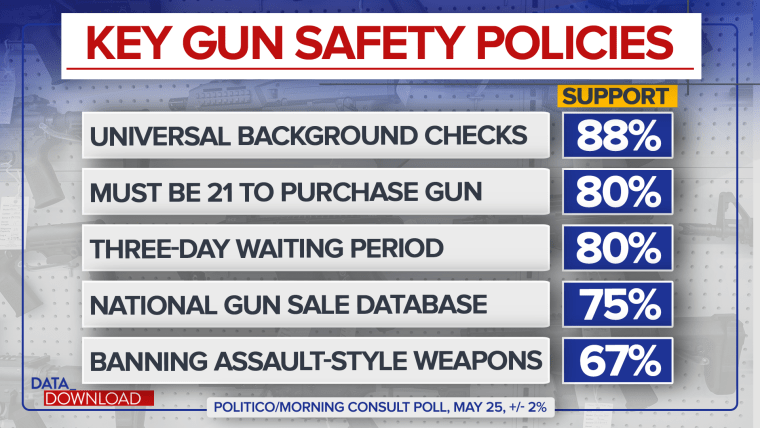WASHINGTON — Another week, another mass shooting, this time at a Texas elementary school. And, as is often the case, another set of calls for more legislation around guns and gun ownership.
Gun control advocates want this time to be different, and they want Congress to pass legislation, but if something is going to happen, it’s probably going to need to happen fast. The usual divide over guns is deep, and, as with many other issues, it falls sharply along partisan lines.
On the surface, the polling data seem to show a country that is evenly divided over guns.
Back in 2019, the NBC News/Wall Street Journal poll looked at a simple question. It asked people whether they were more concerned that the government would go too far in restricting gun rights or that it wouldn’t do enough.
Among all Americans, 45 percent said they were concerned the government would do too much, and 55 percent worried the government wouldn’t do enough. That’s a tight split.

But the numbers are dramatically different when you look at them among Democrats and Republicans.
Among Democrats, 75 percent were worried the government wouldn’t do enough, while 20 percent were concerned the government would go too far. That’s a gap of 55 points leaning toward concern that the government would fail to do enough.
Among Republicans, the numbers were essentially reversed. About three-quarters, 73 percent, were concerned the government would go too far, and only 22 percent worried the government wouldn’t do enough — a gap of 51 points in the other direction.
Consider those figures to be the default. In the absence of a major shooting, such as last week’s massacre in Uvalde, Texas, that’s where the numbers on gun laws have tended to sit for years.
After a major event, however, there is usually movement. You can see the changes in Gallup polling that has long tracked whether Americans want gun laws to be “more strict” or “less strict.”

After the 2018 shootings at Marjory Stoneman Douglas High School in Parkland, Florida, 67 percent of those in the Gallup survey wanted stricter gun laws, and only 4 percent wanted less strict laws. The “more strict” number was down to 57 percent by 2020.
After the 2012 shootings at Sandy Hook Elementary School in Newtown, Connecticut, Gallup found that 58 percent wanted tighter guns rules and that 6 percent wanted less strict rules. By 2013, the “more strict” figure was 49 percent.
And back in 1999, after the shootings at Columbine High School in Littleton, Colorado, 66 percent wanted stricter gun laws, and 7 percent wanted less strict laws, according to Gallup. In 2001, the first number was 53 percent.
In short, the figures immediately after mass shootings suggest a real change in attitudes about gun issues and real momentum for gun control advocates, but those attitudes dissipate fairly quickly.
If there is momentum right now, what kinds of gun control measures have support? A Politico/Morning Consult poll from last week finds strong backing for a variety of proposals.

Nearly 90 percent say they favor universal background checks before people can buy firearms. Eight in 10 believe you should have to be at least 21 years old to buy a gun. The same number want a three-day waiting period on gun purchases. Three-quarters of those surveyed want there to be a national gun sale database. And two-thirds want to ban so-called assault-style weapons.
That’s a big set of items on the wish lists of most gun control advocates. Passing even half of those proposals through Congress would be viewed as a major victory for them.
But again, how long will those attitudes hold? Time is of the essence for gun control supporters — and Congress left town last week until June 6. The real question is not where public opinion on gun control is now but where it will be then.
And even when Congress returns, the divisions highlighted above have deep roots. They have been part of the political scene for decades now, and they aren’t likely to disappear. If Congress again stands pat on major guns laws, the anger and gun control momentum of last week are probably going to have to manifest themselves at the ballot box in November if real change is going to happen.